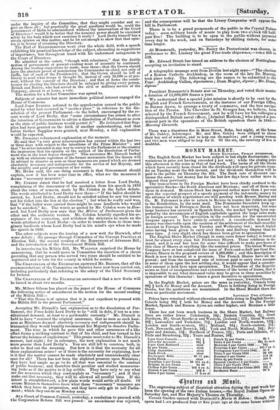Accepting Mr. Disraoli's last explanation as to the dissolution of
Par- liament, the Times holds Lord Derby to be "still in debt, if not to a con- stitutional demand, at least to a pardonable curiosity." Mr. Disraeli is held to have "restored the original assurance, that as soon as such busi- ness as Ministers deemed absolutely necessary and indispensable should be transacted they would humbly recommend her Majesty to dissolve Parlia- ment. The tone in which he gave this and other assurances of a like effect forms a striking contrast to that of his chief, and has turned in his favour the balance of explicitness." This praise must refer to Mr. Disraeli's manner, last night ; for in substance, the new explanation is not much more precise than Lord Derby's. You are still left to construe both, in order to find out the meaning. But how is it that the necessity for all these explanations arises? or if there is the necessity for explaining, how is it that the matter cannot be made absolutely and unmistakeably clear once for all? There has not been the slightest pressure upon Ministers ; they have had ample an pa to do all that was essential to the conduct of public business; and therefore their peculiar and studied manoiuver- ing looks as if the motive to it lay within. They have only to say what are the measures which they contemplate as "necessary" ; and if they make out that necessity, they will be allowed all needful time. If the intent is straightforward, a few plain words would settle all doubt. Of course Ministers themselves know what those "necessary" measures are which they have in preparation, and they have only get to W11 Parlia- ment; which they can do on Monday next.


























 Previous page
Previous page